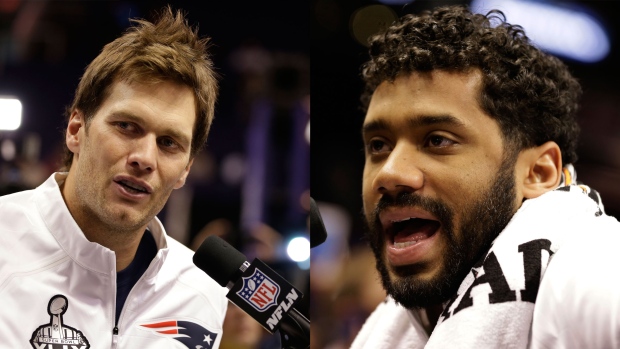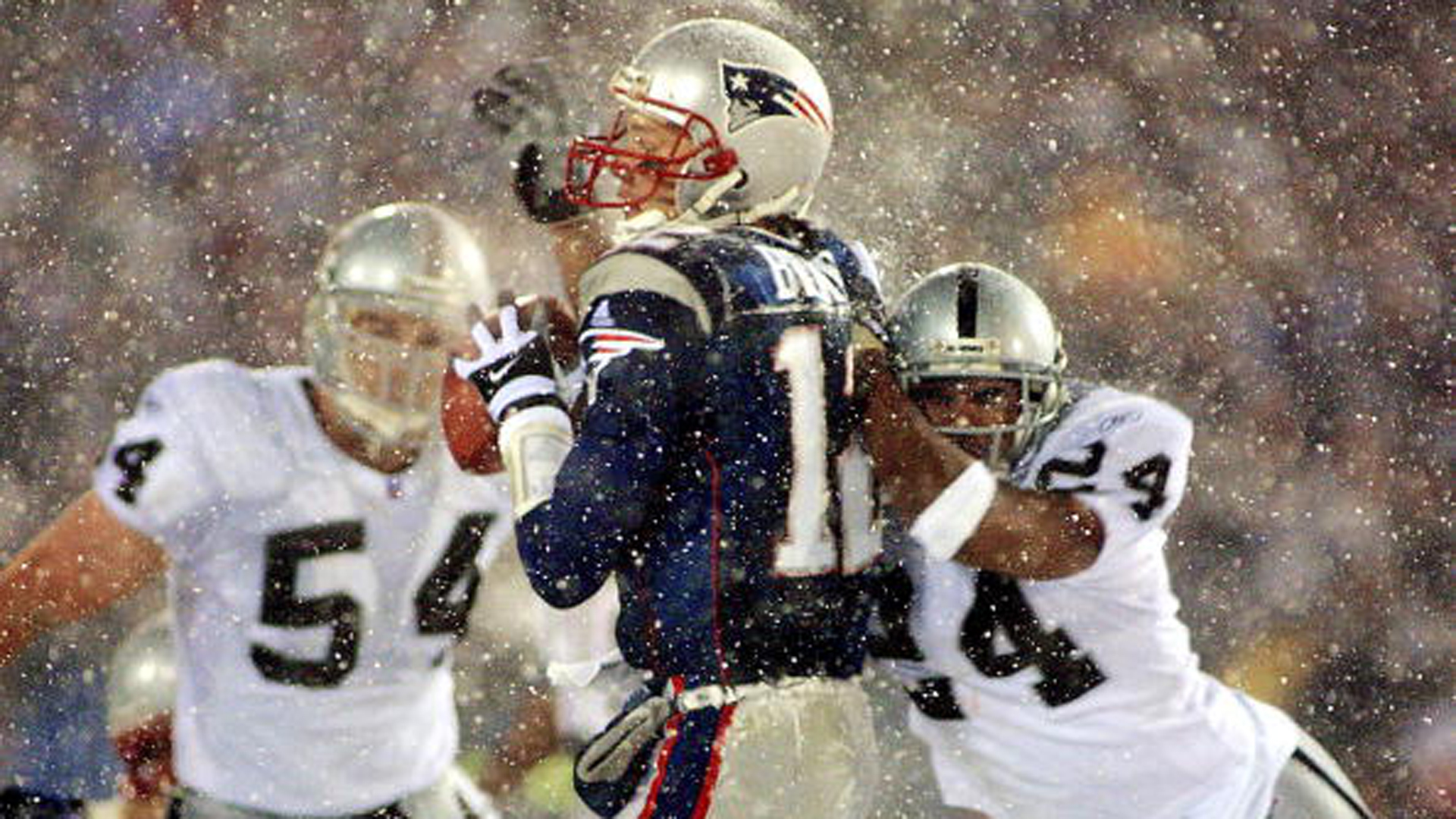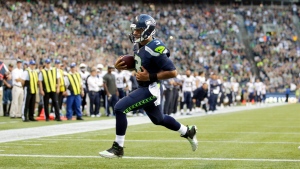Jan 27, 2015
Despite differences, Brady and Wilson share similar successes
Whether it's on the field or on the sidelines, Tom Brady and Russell Wilson have very little in common. When it comes to their pasts, however, the two are extremely similar. The quarterbacks were both underwhelming prospects coming out of college and sat well outside the conversation of first-round picks when draft day rolled around. The unlikely duo become the NFL's faces of success and will now try to add to their legacies as they meet in Super Bowl XLIX.

Whether it's on the field or on the sidelines, Tom Brady and Russell Wilson have very little in common.
When it comes to their pasts, however, the two are extremely similar.
The quarterbacks were both underwhelming prospects coming out of college and sat well outside the conversation of first-round picks when draft day rolled around. Brady wasn't viewed as an athletic quarterback, running a 5.2 second 40-yard dash time coming out of Michigan, and while Wilson's athleticism was never questioned, his ability so succeed was.
Listed generously at 5-foot-11, the former baseball player was viewed as too small to see over an NFL offensive line and therefore have success at the pro level. The Seahawks took Wilson with 75th overall pick of the 2012 NFL Draft, five picks after punter Bryan Anger was selected by the Jacksonville Jaguars.
Wilson was seen largely as a depth pick for the Seahawks, who had just signed former Green Bay Packers backup Matt Flynn to a three-year, $26 million contract in the free agency. Yet, when given his opportunity to compete against Flynn in training camp and the preseason, Wilson outplayed the veteran – who struggled with a shoulder injury – and won the Week 1 start.
The numbers weren't always amazing – he was held under 200 yards passing in nine games – but Wilson did enough for the Seahawks to make the playoffs. In the Wild Card Round, he outdueled injured second-overall pick Robert Griffin III as the Seahawks advanced. One week later, Wilson put together the finest performance of his young career with 385 passing yards and three total touchdowns as the Seahawks narrowly fell 30-28 to the Atlanta Falcons.
 In his second NFL season, Wilson quarterbacked the Seahawks to a 13-3 record and eventually a Super Bowl title. He became the first of the 11 quarterbacks selected in the 2012 draft – including the five picked before him - to win a championship and the only one to win more than one playoff game.
In his second NFL season, Wilson quarterbacked the Seahawks to a 13-3 record and eventually a Super Bowl title. He became the first of the 11 quarterbacks selected in the 2012 draft – including the five picked before him - to win a championship and the only one to win more than one playoff game.
In 2014, Wilson put together another strong campaign in a 12-4 season and led a fourth-quarter 12-point comeback to overcome four interceptions and top the Green Bay Packers in the championship round.
Now, Wilson is looking to become the first quarterback in league history to win two Super Bowls in his first three seasons.
Brady, selected in the sixth round of the 2000 NFL draft, won three Super Bowls in his first five seasons, but unlike Wilson he began his pro career as a fourth-string quarterback and made no meaningful appearances in his rookie year.
In fact, Brady's opportunity start came when quarterback Drew Bledsoe was injured in the second week of the 2001 season. In his first and second starts, Brady threw for a combined 254 yards and no touchdowns before exploding for 364 yards and two touchdowns in a 29-26 victory over the San Diego Chargers in Week 5.

Brady reeled off nine more wins – though without another 300-yard game - as the Patriots reached the playoffs as the AFC's second seed. Led by Brady, and with help from the Tuck Rule, the Patriots went on to defeat the St. Louis Rams in Super Bowl XXXVI for their first league title. Brady, picked 199th overall in the draft just two years earlier, was named Super Bowl MVP.
The Patriots missed the playoffs in 2002 with a 9-7 record before reeling off Super Bowl-winning seasons in both 2003 and 2004 – Brady was again named MVP of XXXVIII in '03.
This season, Brady and Wilson again played major roles in leading their teams back to the big game, though their approach could not have been more different.
Those differences extend to playing styles and beyond. Brady consistently shows an exceptional ability to negotiate the pocket to buy time to find an open receiver, but rarely takes off from the tackle box. Wilson poses a risk to opposing defences as both a passer and a rusher, and is seemingly never afraid to take off with the football.
 Wilson represents a new breed of quarterback in the NFL, the dual-threat passer. Wilson's classmates in that regard - Colin Kaepernick, Robert Griffin III and Cam Newton - all largely struggled as defences adjusted to limit their abilities in 2014. But Wilson flourished again.
Wilson represents a new breed of quarterback in the NFL, the dual-threat passer. Wilson's classmates in that regard - Colin Kaepernick, Robert Griffin III and Cam Newton - all largely struggled as defences adjusted to limit their abilities in 2014. But Wilson flourished again.
On the ground this season, Wilson was again able to present constant difficulties for opponents and rushed for a career-high 849 yards with six touchdowns. The third-year pro also threw for 20 touchdowns to seven interceptions in the regular season. His dual-threat abilities allowed him to extend plays and gain yards as the pocket around him broke down. It's also worth noting that Wilson lost none of his five rushing fumbles on the season.
"He doesn't fit the mould of anything I thought previously would be a franchise quarterback," wide receiver Doug Baldwin said prior to the NFC Championship against Green Bay. "I think he still gets a lot of hate and discredit because we don't throw the ball that often. However, what he's asked to do in this offence he does it extremely well."
Brady, the prototypical franchise quarterback, put together an MVP-worthy campaign in 2014 with 4,109 passing yards, 33 touchdowns and nine interceptions during a 12-4 campaign. On the ground, he rushed for just 57 yards on 36 attempts – in 13 seasons as a starter, Brady has rushed for 823 total yards. The 37-year-old also put together a passer rating of 99.3 or higher in each of the Patriots two playoff games.
One similarity both quarterbacks shared this season, however, was excelling without having a true star in their wide receiver corps. Wilson's leading receivers, Baldwin and Jermaine Kearse, were both undrafted free agents out of college and Brady's leading receivers, Julian Edelman and Brandon LaFell, were drafted in the seventh and third round, respectively. Brady does, however, hold the advantage of throwing to star tight end Rob Gronkowski.
On the sidelines, the differences between the two are perhaps equally apparent as on the field.
 Brady, the truest of competitors, has had no shortage of profanity-laced tirades on the sidelines throughout his career to inspire - or express his disappointment to – his teammates.
Brady, the truest of competitors, has had no shortage of profanity-laced tirades on the sidelines throughout his career to inspire - or express his disappointment to – his teammates.
Oppositely, the seemingly always positive and composed Wilson refuses to show anger or get in the face of his teammates during trying times. Wilson's demeanor was tested throughout the season, such as when Baldwin challenged him during a loss to the Dallas Cowboys, or as his team was minutes away from elimination after he threw four interceptions in the NFC Championship game – two which came off the hands of Kearse. Yet, Wilson consistently persevered and led his team to the verge of a Super Bowl once again.
It's often argued that in order to reach - and win - a Super Bowl, teams need a star quarterback. Though some have disproven this theory, i.e. Trent Dilfer and Brad Johnson, the sentiment largely rings true. The past 11 Super Bowls, with the exception and Joe Flacco and Wilson (as of now), have all been won by quarterbacks with a spot waiting for them in Canton. With a win on Sunday, Wilson can likely add his name to that list.
Despite their differences, Brady and Wilson find themselves pitted against each other on the NFL's biggest stage and both will be out to extend their legacies on Sunday.
"Russell and Tom Brady are both great winners," Seahawks head coach Pete Carroll explained earlier this week. "Tom has had a long time to prove that. Russell is at the early stages of proving that to the world. But he's got a chance to be similar."
And, perhaps, a chance to be better.
Tom Brady vs. Russell Wilson Entering Super Bowl XLIX
| Brady (199th pick, 2000 NFL Draft) | Wilson (75th pick, 2012 NFL Draft) | |
|---|---|---|
| 5 | Super Bowl Appearances | 1 |
| 3 | Super Bowl Wins | 1 |
| 2 | Super Bowl MVPs | 0 |
| 12-4 | 2014 Record | 12-4 |
| 4,109 | 2014 Pass Yards | 3,475 |
| 33 | 2014 Pass TDs | 20 |
| 9 | 2014 Pass INTs | 7 |
| 57 | 2014 Rush Yards | 849 |
| 0 | 2014 Rush TDs | 6 |
| 53,258 | Career Pass Yards | 9,950 |
| 392 | Career Pass TDs | 72 |
| 143 | Career Pass INTs | 26 |
| 823 | Career Rush Yards | 1,877 |
| 14 | Career Rush TDs | 11 |
| 160 | Career Wins | 36 |
| 20 | Career Playoff Wins | 6 |
| 47 | Career Losses | 12 |
| 8 | Career Playoff Losses | 1 |



